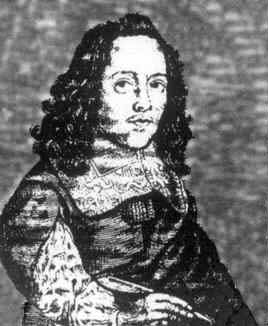


 تاريخ الرياضيات
تاريخ الرياضيات
 الرياضيات في الحضارات المختلفة
الرياضيات في الحضارات المختلفة 
 الرياضيات المتقطعة
الرياضيات المتقطعة
 الجبر
الجبر
 الهندسة
الهندسة 
 المعادلات التفاضلية و التكاملية
المعادلات التفاضلية و التكاملية 
 التحليل
التحليل
 علماء الرياضيات
علماء الرياضيات |
Read More
Date: 24-1-2016
Date: 24-1-2016
Date: 19-1-2016
|
Born: 1631 in England
Died: 22 August 1676 in London, England

Edward Cocker worked in London as an engraver, teaching writing and arithmetic. He also wrote poetry and was a skilful calligrapher with considerable artistic talent which enabled him to make a living producing copy-books.
In 1657 he was living ([2]):-
... on the south side of St Paul's Churchyard, over against St Paul's Chain ... where he taught the art of writing and arithmetick in an extraordinary manner.
In 1664 he moved Gutter Lane, still close to St Paul's Churchyard. Certainly he did not remain long at his new address since he is mentioned in letters of Collins to Wallis in 1666 and 1667 and by that time he was living in Northampton. We do not know of his movements from this time until he was back in London in 1674, when he started a public school near St George's Southwark.
Cocker produced over 20 copybooks and, according to the expert A Heal:-
... he delighted to embroider the books with fantastic creatures, exotic birds ... his knots and flourishes are wonderful pieces of exuberant penmanship.
In addition to the copy-books Cocker wrote Cocker's Urania and Cocker's Morals (1675) composed of rhyming couplets. In this last work he writes:-
Arithmetick let a man understand
And after that, Geometry command.
Then let him turn Astronomer and prove
How many Stars are fix'd, how many move.
Next a Geographer Earth's Globe survey
The long-sought, unfound Longitude display.
Apollo's Lyre next let him take in hand,
And all the high Soul-charming Aires command.
Yea, let him have all Arts, all are but smoke
To him that hath no money in his Poke.
In 1664 he published Tutor to writing and arithmetick which contained 7 pages of text on calligraphy and 49 pages on arithmetic. His most famous work, however, was Cocker's Arithmetic which ran to more than 100 editions over a period of about 100 years. It was published in 1678, after Cocker's death, edited by John Hawkins. A phrase according to Cocker was common usage for many years, it meant absolutely correct.
The editor of the 1678 first edition of Cocker's Arithmetic, John Hawkins, wrote two books of his own, Clavis Commercii (1689) and The English School-master compleated (1692) as well as editing the third edition of Jonas Moore's Arithmetick (1688). It has been claimed that he was the author, rather than Cocker, of Cocker's Arithmetic.
The first to suggest that Cocker's Arithmetic was written by John Hawkins was De Morgan. It was in 1847 that De Morgan published his claim, giving a long list of reasons, stating:-
I am perfectly satisfied that Cocker's Arithmetic is a forgery of Hawkins ...
Among his reasons was that Cocker's Preface says that he is now publishing the work, while Hawkin's Preface says that Cocker refused to publish. However some, such as Salmon [5], defended Hawkins and argued against De Morgan. For example he countered the point above by saying that Cocker's Preface must be genuine otherwise Hawkins would not have been so stupid to have the two Preface's contradict each other. The recent article [6], which is a delight to read, argues convincingly that:-
Research now shows that there is little doubt that it was really Cocker's work.
The story is complicated by the fact that other books were to appear claiming to be by Cocker. Cocker's Accomplish'd School-Master appeared in 1696 while Cocker's English Dictionary appeared in 1704. These are almost certainly not due to Cocker but were written to cash in on the high sales that Cocker's name produced.
Cocker died with no money in his Poke to quote his own phrase. As Wallis writes in [6]:-
Subsequently he might well have suffered material loss in the Fire and have had the expense of successive removals. He may also have spent extravagantly. He possessed 'some choice Manuscripts, and a great Collection of Printed Authors in several Languages' ... In any event, he died in debt, 'within the rules' of the King's Bench Prison, which was situated in Southwark; the quoted phrase meant that the prisoner had purchased the right to live within a short distance of the prison. Cocker's move to Southwark was probably an enforced one, consequent on his committal for debt.
Articles:



|
|
|
|
دخلت غرفة فنسيت ماذا تريد من داخلها.. خبير يفسر الحالة
|
|
|
|
|
|
|
ثورة طبية.. ابتكار أصغر جهاز لتنظيم ضربات القلب في العالم
|
|
|
|
|
|
|
قسم الشؤون الفكرية ينظم ندوة ثقافية بذكرى فاجعة هدم قبور أئمة البقيع (عليهم السلام)
|
|
|